小学英语动词词组句型汇总归纳
- 格式:doc
- 大小:23.50 KB
- 文档页数:4
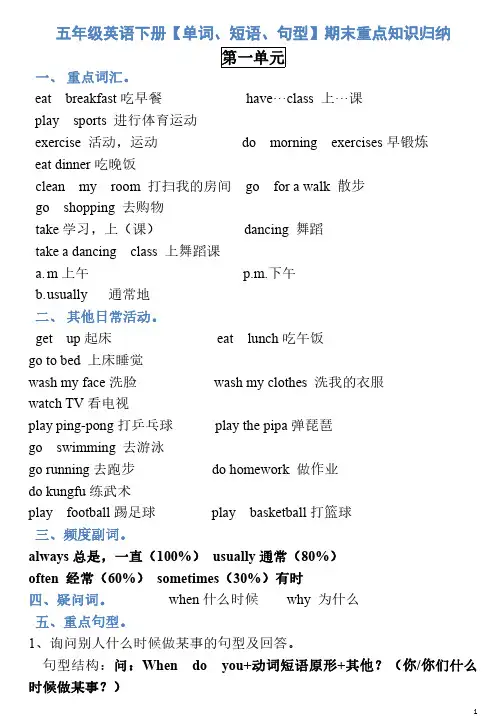
五年级英语下册【单词、短语、句型】期末重点知识归纳一、重点词汇。
eat breakfast吃早餐have···class上···课play sports进行体育运动exercise活动,运动do morning exercises早锻炼eat dinner吃晚饭clean my room打扫我的房间go for a walk散步go shopping去购物take学习,上(课)dancing舞蹈take a dancing class上舞蹈课a.m上午p.m.下午ually通常地二、其他日常活动。
get up起床eat lunch吃午饭go to bed上床睡觉wash my face洗脸wash my clothes洗我的衣服watch TV看电视play ping-pong打乒乓球play the pipa弹琵琶go swimming去游泳go running去跑步do homework做作业do kungfu练武术play football踢足球play basketball打篮球三、频度副词。
always总是,一直(100%)usually通常(80%)often经常(60%)sometimes(30%)有时四、疑问词。
when什么时候why为什么五、重点句型。
1、询问别人什么时候做某事的句型及回答。
句型结构:问:When do you+动词短语原形+其他?(你/你们什么时候做某事?)答:I/we(+频度副词)+动词短语原形+at+具体时间(我/我们通常在几点做某事。
)例:问:When do you go to bed?(你什么时候上床睡觉?)答:I go to bed at9:00p.m(我晚上9点上床睡觉。
)注意:当主语是第三人称单数(he,she,it,单个人名或单数名词)时,助动词do要变成does,句型结构是:when does+主语(第三人称单数)+动词短语原形+其他?2、询问别人周末做什么的句型及回答。
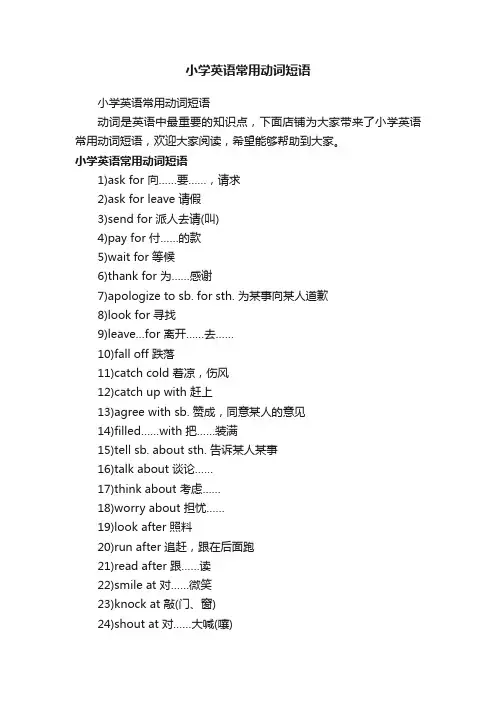
小学英语常用动词短语小学英语常用动词短语动词是英语中最重要的知识点,下面店铺为大家带来了小学英语常用动词短语,欢迎大家阅读,希望能够帮助到大家。
小学英语常用动词短语1)ask for 向……要……,请求2)ask for leave 请假3)send for 派人去请(叫)4)pay for 付……的款5)wait for 等候6)thank for 为……感谢7)apologize to sb. for sth. 为某事向某人道歉8)look for 寻找9)leave…for 离开……去……10)fall off 跌落11)catch cold 着凉,伤风12)catch up with 赶上13)agree with sb. 赞成,同意某人的意见14)filled……with 把……装满15)tell sb. about sth. 告诉某人某事16)talk about 谈论……17)think about 考虑……18)worry about 担忧……19)look after 照料20)run after 追赶,跟在后面跑21)read after 跟……读22)smile at 对……微笑23)knock at 敲(门、窗)24)shout at 对……大喊(嚷)25)throw away 扔掉26)work hard at 努力做……27)wait in line 排队等候28)change…into… 变成29)hurry into… 匆忙进入30)run into… 跑进31)hear of 听说32)think of 认为,考虑33)catch hold of 抓住34)instead of 代替……35)hand in 交上来36)stay in bed 卧病在床37)hear from 收到……来信【小学英语常用动词短语】。
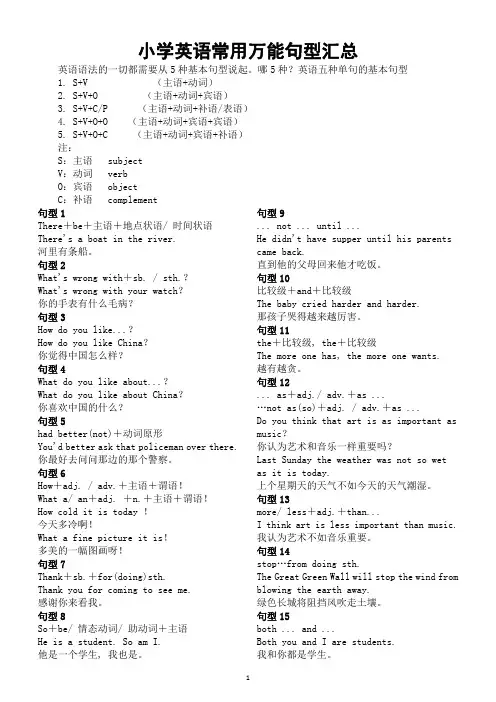
小学英语常用万能句型汇总英语语法的一切都需要从5种基本句型说起。
哪5种?英语五种单句的基本句型1. S+V (主语+动词)2. S+V+O (主语+动词+宾语)3. S+V+C/P (主语+动词+补语/表语)4. S+V+O+O (主语+动词+宾语+宾语)5. S+V+O+C (主语+动词+宾语+补语)注:S:主语 subjectV:动词 verbO:宾语 objectC:补语 complement句型1There+be+主语+地点状语/ 时间状语There's a boat in the river.河里有条船。
句型2What's wrong with+sb. / sth.?What's wrong with your watch?你的手表有什么毛病?句型3How do you like...?How do you like China?你觉得中国怎么样?句型4What do you like about...?What do you like about China?你喜欢中国的什么?句型5had better(not)+动词原形You'd better ask that policeman over there. 你最好去问问那边的那个警察。
句型6How+adj. / adv.+主语+谓语!What a/ an+adj. +n.+主语+谓语!How cold it is today !今天多冷啊!What a fine picture it is!多美的一幅图画呀!句型7Thank+sb.+for(doing)sth.Thank you for coming to see me.感谢你来看我。
句型8So+be/ 情态动词/ 助动词+主语He is a student. So am I.他是一个学生, 我也是。
句型9... not ... until ...He didn't have supper until his parents came back.直到他的父母回来他才吃饭。
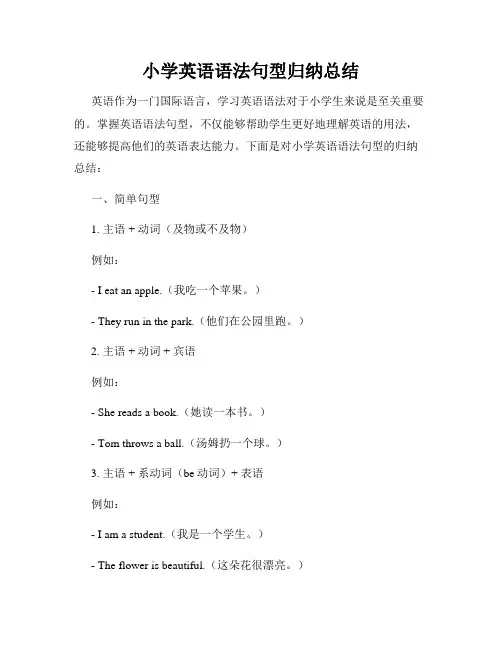
小学英语语法句型归纳总结英语作为一门国际语言,学习英语语法对于小学生来说是至关重要的。
掌握英语语法句型,不仅能够帮助学生更好地理解英语的用法,还能够提高他们的英语表达能力。
下面是对小学英语语法句型的归纳总结:一、简单句型1. 主语 + 动词(及物或不及物)例如:- I eat an apple.(我吃一个苹果。
)- They run in the park.(他们在公园里跑。
)2. 主语 + 动词 + 宾语例如:- She reads a book.(她读一本书。
)- Tom throws a ball.(汤姆扔一个球。
)3. 主语 + 系动词(be动词)+ 表语例如:- I am a student.(我是一个学生。
)- The flower is beautiful.(这朵花很漂亮。
)4. 主语 + 系动词(be动词)+ 地点例如:- The book is on the table.(书在桌子上。
)- The cat is under the chair.(猫在椅子下面。
)二、疑问句1. 一般疑问句使用助动词do、does或did加在句子的主语前,然后再加上动词原形。
例如:- Do you like ice cream?(你喜欢冰淇淋吗?)- Does he play basketball?(他打篮球吗?)2. 特殊疑问句特殊疑问句是用来询问特定信息或细节的问句,通常以疑问代词开头。
例如:- What is your name?(你叫什么名字?)- When is your birthday?(你的生日是什么时候?)- Where do you live?(你住在哪里?)在句子前面加上否定词,通常为don't、doesn't或didn't。
例如:- I don't like pizza.(我不喜欢披萨。
)- He doesn't have a pet.(他没有宠物。
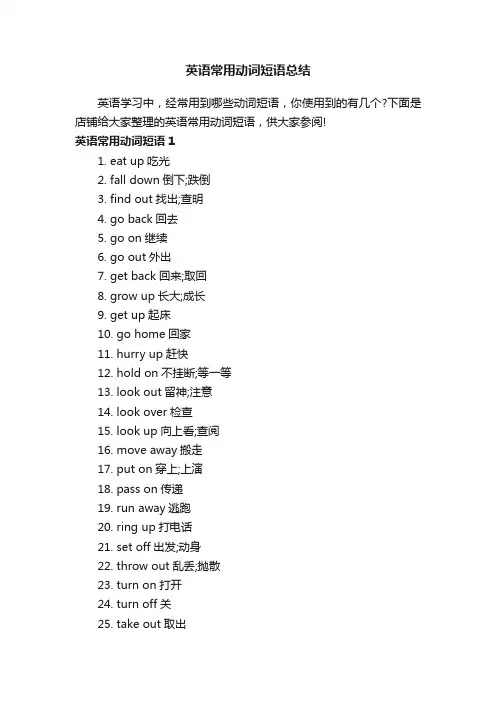
英语常用动词短语总结英语学习中,经常用到哪些动词短语,你使用到的有几个?下面是店铺给大家整理的英语常用动词短语,供大家参阅!英语常用动词短语11. eat up吃光2. fall down倒下;跌倒3. find out找出;查明4. go back回去5. go on继续6. go out外出7. get back回来;取回8. grow up长大;成长9. get up起床10. go home回家11. hurry up赶快12. hold on不挂断;等一等13. look out留神;注意14. look over检查15. look up向上看;查阅16. move away搬走17. put on穿上;上演18. pass on传递19. run away逃跑20. ring up打电话21. set off出发;动身22. throw out乱丢;抛散23. turn on打开24. turn off关25. take out取出英语常用动词短语21. agree with同意……意见;符合;一致2. ask for请求;询问3. arrive at/in到达4. begin with以……开始5. come from来自6. feel like想要7. fall behind落在……后面8. fall off掉下9. get to到达10. get on上(车)11. get off下来;从……下来12. hear of听说13. knock at/on敲(门、窗等)14. laugh at嘲笑15. look at看16. look after照看17. listen to听18. look for寻找19. quarrel with吵架20. stop...from阻止……做……21. wait for等候22. come out出来;花开23. come over顺便来访;过来24. come along来;随同25. come in进来英语常用动词短语31. trip over绊倒2. turn...over把……翻过来3. write down写下;记下4. wake up醒来5. work out算出;解出6. be late for迟到7. be angry with生气8. be busy with忙于9. be short for是……的简称10. be interested in对……感兴趣11. be famous for因……而著名12. be good at擅长13. be different from与……不同14. be good/bad for对……有益/害15. be friendly to对……友好16. take care of照料;照顾17. make room for给……腾出地方18. make friends with与……交朋友19. play a joke on戏弄某人20. have a look at看一看21. have a drink of喝一点22. say goodbye to告别;告辞23. be fed up with厌倦24. catch up with赶上25. go on with继续。
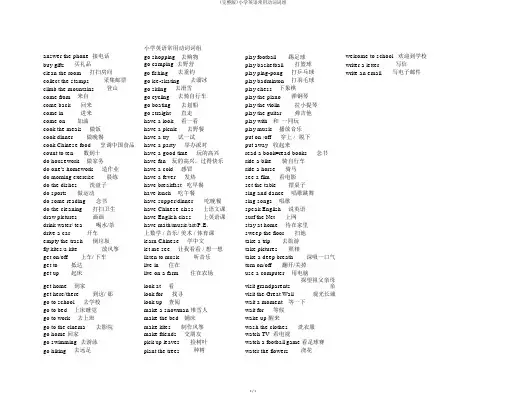
(完整版)小学英语常用动词词组1 / 1小学英语常用动词词组 answer the phone 接电话go shopping 去购物 play football 踢足球 welcome to school 欢迎到学校 buy gifts 买礼品go camping 去野营 play basketball 打篮球 writer a letter 写信 clean the room 打扫房间go fishing 去垂钓 play ping-pong 打乒乓球 write an email 写电子邮件 collect the stamps 采集邮票go ice-skating 去溜冰 play badminton 打羽毛球 climb the mountains 登山go skiing 去滑雪 play chess 下象棋 come from 来自go cycling 去骑自行车 play the piano 弹钢琴 come back 回来go boating 去划船 play the violin 拉小提琴 come in 进来go straight 直走 play the guitar 弹吉他 come on 加油have a look 看一看 play with 和 一同玩 cook the meals 做饭have a picnic 去野餐 play music 播放音乐 cook dinner 做晚餐have a try 试一试 put on /off 穿上 / 脱下 cook Chinese food 烹调中国食品have a party 举办派对 put away 收起来 count to ten 数到十have a good time 玩的高兴 read a book=read books 念书 do housework 做家务have fun 玩的高兴,过得快乐 ride a bike 骑自行车 do one's homework 造作业have a cold 感冒 ride a horse 骑马 do morning exercise 晨练have a fever 发热 see a film 看电影 do the dishes 洗盘子have breakfast 吃早餐 set the table 摆桌子 do sports 做运动have lunch 吃午餐 sing and dance 唱歌跳舞 do some reading 念书have supper/dinner 吃晚餐 sing songs 唱歌 do the cleaning 打扫卫生have Chinese class 上语文课 speak English 说英语 draw pictures 画画have English class 上英语课 surf the Net 上网 drink water/ tea 喝水/茶have math/music/art/P.E. stay at home 待在家里 drive a car 开车上数学 / 音乐/ 美术 / 体育课 sweep the floor 扫地 empty the trash 倒垃圾learn Chinese 学中文 take a trip 去旅游 fly kites/a kite 放风筝let me see 让我看看 / 想一想 take pictures 照相 get on/off 上车/ 下车listen to music 听音乐 take a deep breath 深吸一口气 get to 抵达live in 住在 turn on/off 翻开/关掉 get up 起床live on a farm 住在农场 use a computer 用电脑 get home 到家look at 看 visit grandparents 探望祖父亲母亲 get here/there 到这/ 那look for 找寻 visit the Great Wall 观光长城 go to school 去学校look up 查阅 wait a moment 等一下 go to bed 上床睡觉make a snowman 堆雪人 wait for 等候 go to work 去上班make the bed 铺床 wake up 醒来 go to the cinema 去影院make kites 制作风筝 wash the clothes 洗衣服 go home 回家make friends 交朋友 watch TV 看电视 go swimming 去游泳pick up leaves 捡树叶 watch a football game 看足球赛 go hiking 去远足 plant the trees 种树 water the flowers 浇花。
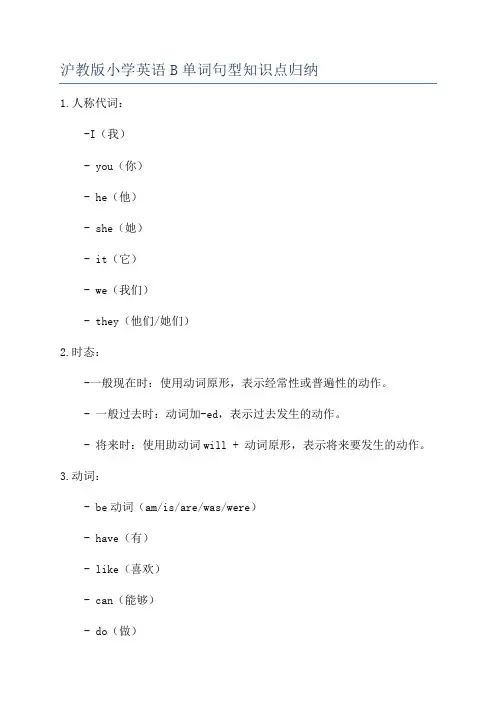
沪教版小学英语B单词句型知识点归纳1.人称代词:-I(我)- you(你)- he(他)- she(她)- it(它)- we(我们)- they(他们/她们)2.时态:-一般现在时:使用动词原形,表示经常性或普遍性的动作。
- 一般过去时:动词加-ed,表示过去发生的动作。
- 将来时:使用助动词will + 动词原形,表示将来要发生的动作。
3.动词:- be动词(am/is/are/was/were)- have(有)- like(喜欢)- can(能够)- do(做)- eat(吃)- drink(喝)- play(玩)- go(去)- see(看见)- want(想要)4.表示位置的介词:- in(在...里面)- on(在...上面)- under(在...下面)- behind(在...后面)- in front of(在...前面)- beside(在...旁边)5.数字:- one(一)- two(二)- three(三)- four(四)- five(五)- six(六)- seven(七)- eight(八)- nine(九)- ten(十)6.表示询问的句型:- What's your name?(你叫什么名字?)- How old are you?(你几岁了?)- What do you like?(你喜欢什么?)- Can you...?(你会...吗?)7.表示回答的句型:- My name is...(我的名字是...)- I am... years old.(我...岁了)- I like...(我喜欢...)- Yes, I can. / No, I can't.(是的,我会。
/不,我不会。
)。
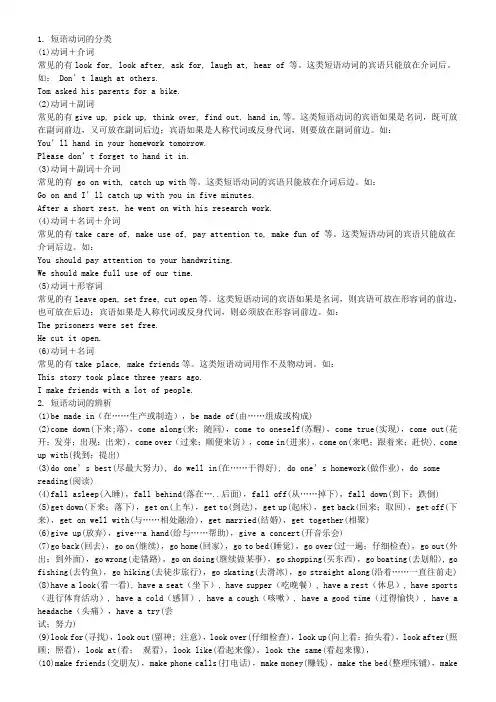
1. 短语动词的分类(1)动词+介词常见的有look for, look after, ask for, laugh at, hear of 等。
这类短语动词的宾语只能放在介词后。
如:Don’t laugh at others.Tom asked his parents for a bike.(2)动词+副词常见的有give up, pick up, think over, find out, hand in,等。
这类短语动词的宾语如果是名词,既可放在副词前边,又可放在副词后边;宾语如果是人称代词或反身代词,则要放在副词前边。
如:You’ll hand in your homework tomorrow.Please don’t forget to hand it in.(3)动词+副词+介词常见的有 go on with, catch up with等。
这类短语动词的宾语只能放在介词后边。
如:Go on and I’ll catch up with you in five minutes.After a short rest, he went on with his research work.(4)动词+名词+介词常见的有take care of, make use of, pay attention to, make fun of 等。
这类短语动词的宾语只能放在介词后边。
如:You should pay attention to your handwriting.We should make full use of our time.(5)动词+形容词常见的有leave open, set free, cut open等。
这类短语动词的宾语如果是名词,则宾语可放在形容词的前边,也可放在后边;宾语如果是人称代词或反身代词,则必须放在形容词前边。
如:The prisoners were set free.He cut it open.(6)动词+名词常见的有take place, make friends等。
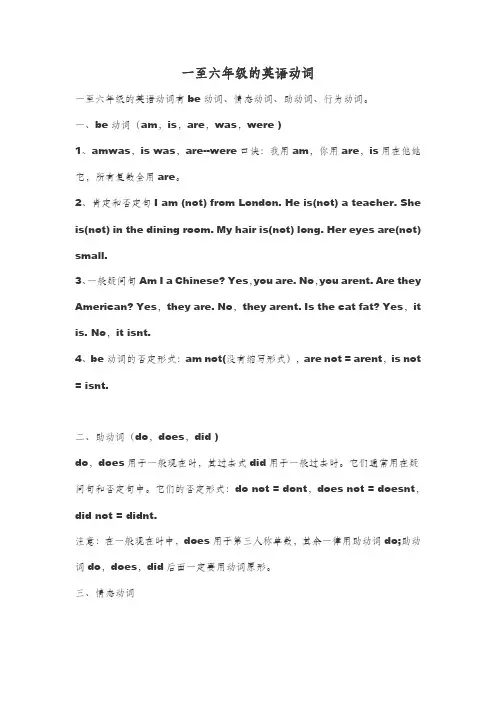
一至六年级的英语动词一至六年级的英语动词有be动词、情态动词、助动词、行为动词。
一、be动词(am,is,are,was,were )1、amwas,is was,are--were口诀:我用am,你用are,is用在他她它,所有复数全用are。
2、肯定和否定句I am (not) from London. He is(not) a teacher. She is(not) in the dining room. My hair is(not) long. Her eyes are(not) small.3、一般疑问句Am I a Chinese? Yes,you are. No,you arent. Are they American? Yes,they are. No,they arent. Is the cat fat? Yes,it is. No,it isnt.4、be动词的否定形式:am not(没有缩写形式),are not = arent,is not = isnt.二、助动词(do,does,did )do,does用于一般现在时,其过去式did用于一般过去时。
它们通常用在疑问句和否定句中。
它们的否定形式:do not = dont,does not = doesnt,did not = didnt.注意:在一般现在时中,does用于第三人称单数,其余一律用助动词do;助动词do,does,did后面一定要用动词原形。
三、情态动词情态动词也是一类特殊的动词,平时我们不把它说成是动词。
情态动词可以和行为动词同时出现在同一个句子中。
我们现在学过的情态动词有:can、could、shall、should、will、would、may、might、must.注意:情态动词后动词总是用原形。
(不受其他任何条件影响)四、行为动词就是平时上课时说的动词,表示某一动作或行为。
如:sweep、live等。
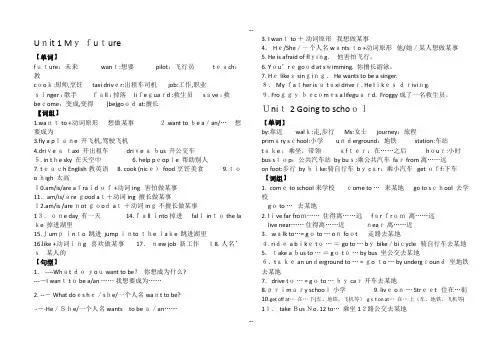
Unit 1 Myfuture【单词】future:未来want:想要 pilot:飞行员teach:教cook:厨师,烹饪 taxi driver:出租车司机job:工作,职业singer :歌手fall :掉落lifeguard :救生员save :救become:变成,变得(be)good at:擅长【词组】1.want to +动词原形想做某事2.want to be a/an/…想要成为3.fly a plane 开飞机,驾驶飞机4.drive ataxi 开出租车drive abus 开公交车5. in the sky 在天空中 6. help people 帮助别人7. teach English 教英语8. cook (nice) food 烹饪美食9.too high 太高10.am/is/are afraid of +动词ing 害怕做某事11.am/is/are good at+动词ing 擅长做某事12.am/is /are not good at+动词ing不擅长做某事13.one day 有一天14.fall into 掉进 fall into the la ke 掉进湖里15.jumpinto 跳进 jump into the lake 跳进湖里16.like +动词ing 喜欢做某事17.new job 新工作18. 人名’s某人的【句型】1. ----What doyou want to be?你想成为什么?----I want to be a/an ……我想要成为……2.--- What does he/she/一个人名 want to be?---He/She/一个人名wants to be a/an……3. I want to +动词原形我想做某事4. He/She/一个人名 wants to +动词原形他/她/某人想做某事5. He is afraid of flying.他害怕飞行。
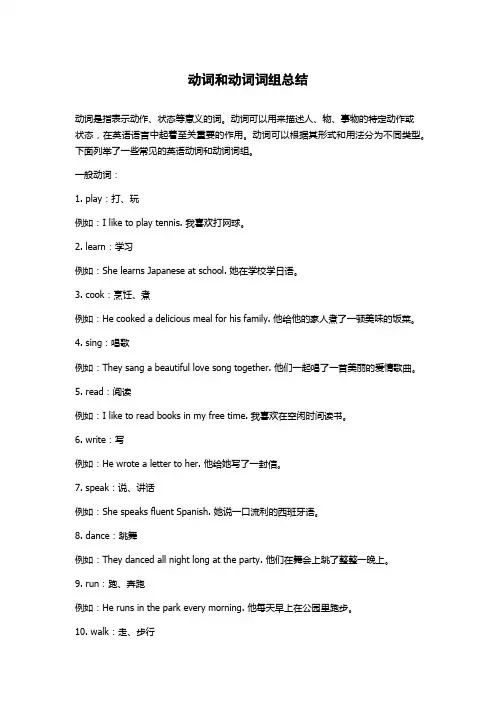
动词和动词词组总结动词是指表示动作、状态等意义的词。
动词可以用来描述人、物、事物的特定动作或状态,在英语语言中起着至关重要的作用。
动词可以根据其形式和用法分为不同类型。
下面列举了一些常见的英语动词和动词词组。
一般动词:1. play:打、玩例如:I like to play tennis. 我喜欢打网球。
2. learn:学习例如:She learns Japanese at school. 她在学校学日语。
3. cook:烹饪、煮例如:He cooked a delicious meal for his family. 他给他的家人煮了一顿美味的饭菜。
4. sing:唱歌例如:They sang a beautiful love song together. 他们一起唱了一首美丽的爱情歌曲。
5. read:阅读例如:I like to read books in my free time. 我喜欢在空闲时间读书。
6. write:写例如:He wrote a letter to her. 他给她写了一封信。
7. speak:说、讲话例如:She speaks fluent Spanish. 她说一口流利的西班牙语。
8. dance:跳舞例如:They danced all night long at the party. 他们在舞会上跳了整整一晚上。
9. run:跑、奔跑例如:He runs in the park every morning. 他每天早上在公园里跑步。
10. walk:走、步行例如:She walks to the office every day. 她每天步行去办公室。
动词词组:1. get up:起床例如:I usually get up at six o'clock in the morning. 我通常在早上六点钟起床。
2. wake up:醒来例如:I woke up late this morning. 我今天早上起得比较晚。
小学五年级英语语法知识点总结大全小学五年级英语语法知识点总结大全一be动词(am、is、are)+not、情态动词can+not、助动词(do、does)+not如何将一个肯定的陈述句改为否定句:1、看句中有无be动词,如有,直接在be动词后+not。
2、看句中有无情态动词,如有,直接在情态动词后+not。
3、如上述二者都没有,就应用助动词+not。
分四个步骤:(1)肯定陈述句中本来是没有助动词的,要加上去,位置在主语(某人或某物)后,动词前。
(2)确定助动词用do、does,根据句中动词,动词是原形的助动词就用do,动词是第三人称单数的助动词就用does。
(3)在助动词后加not。
(4)原句中动词假如发生变化就要恢复成原形。
小学五年级英语语法知识点总结大全二1:“first”是序数词,与“the”相连,解释为第一。
2:像“first,term,world”作为词组出现时前面要加“the”。
3:“all”所有;后面的可数名词用复数形式,be动词用“are”。
4:“any”一些;用在否定句和一般疑问句中,与“some”同义。
“some”用在肯定句中。
5:there be+数词,采用“就近原则”。
6:a map of China 与 a map of the world 要牢记。
7:要用“on the wall”,不能用“in the wall”。
门、窗在墙上才能用“in the wall”。
8:can 后+动词原形。
9:play+the+乐器; play+球类;10:like的用法11:动词变动名词形式方法:A--直接在动词后面+ing形式(大多数)。
B--以不发音的“e”结尾的,要去掉e后再+ing,比如:dancing,making,riding。
C--重读be音节,末尾只有一个辅音,须双写末尾的字母后再+ing,如:running,swimming,sitting,putting。
12:现在进行时的构成:be动词+动词ing形式。
四年级英语下册【单词、短语、句型】期末重点知识归纳Unit1My school(我的学校)一、单词:楼层:first floor一楼second floor二楼教室:teachers’office教师办公室library图书馆playground操场computer room计算机房music room音乐教室art room美术教室gym体育馆其他:next to在近旁homework作业class班;班级forty四十way方向指示代词:this这,这个(通常指空间上离我们较近的单数物品) that那,那个(通常指空间上离我们较远的单数物品)二、重点句型::Where is the library?图书馆在哪里?It’s on the second floor.它在二楼。
:Is this the art room?这是美术教室吗?Yes,it is.No,it isn’t.Is that the teacher’s office?那是…吗?Yes,it is.No,it isn’t.Is it a computer?它是计算机吗?Yes,it is.No,it isn’t.Do you have a playground?你们(学校)有操场吗?Yes,we do.No,we don’t.How many students are there in your class?你班有多少个学生?Forty-five students.四十五个学生。
礼貌待客“这边请”This way please.P5:Let’s do部分:Go to the library.Read a book.去图书馆,读书。
Go to the teacher’s office.Say hello.去教师办公室,说您好!Go to the playground.Play football.去操场,踢足球。
Go to the garden.Water the flowers.去花园,浇花。
动词短语知识点总结动词短语是由一个或多个动词和它们的宾语、补语、副词、介词短语等修饰语组成的短语。
动词短语是语言中最基本的成分之一,它主要用来表达动作、状态或行为。
在英语中,动词短语的种类繁多,使用频率较高,因此掌握动词短语对于学习英语至关重要。
下面我们就来总结一下动词短语的知识点。
一、动词短语的构成动词短语由动词和其后的宾语、补语、副词、介词短语等修饰语组成,其中主要包括以下几种结构:1. 动词 + 名词如:take a walk(散步)、make a decision(做决定)、have a drink(喝一杯)2. 动词 + 副词如:go out(出去)、come in(进来)、look up(查找)3. 动词 + 介词短语如:come across(偶然发现)、look for(寻找)、give up(放弃)4. 动词 + 宾语 + 宾语补足语如:make him happy(使他高兴)、call her a doctor(叫她医生)5. 动词 + 宾语 + 宾语补语如:consider him a friend(认为他是朋友)、find the room clean(发现房间干净)6. 动词 + 宾补如:find the food delicious(发现食物好吃)、keep the door closed(保持门闭着)7. 动词 + 状语如:speak clearly(讲话清楚)、run fast(跑得快)二、动词短语的用法1. 表示动作或状态动词短语主要用来表达动作或状态,如:make a decision(做决定)、come in(进来)、look for(寻找)等。
2. 表示行为方式有些动词短语可以表示动作执行的方式,如:speak clearly(讲话清楚)、run fast(跑得快)、write neatly(写得整洁)等。
3. 表示时间和频率动词短语还可以表示时间和频率,如:go out(出去)、come across(偶然遇见)、look forward to(期待)等。
可编辑修改精选全文完整版小学一年级英语知识点归纳小学一年级英语知识点归纳1.动词be(is,am,are)的用法我(I)用am,你(you)用are,is跟着他(he),她(she),它(it)。
单数名词用is,复数名词全用are。
变否定,更容易,be后not加上去。
变疑问,往前提,句末问号莫丢弃。
还有一条须注意,句首大写莫忘记。
2.this,that和it用法(1)this和that是指示代词,it是人称代词。
(2)距离说话人近的人或物用this, 距离说话人远的人或物用that。
如: This is a flower. 这是一朵花。
(近处)That is a tree. 那是一棵树。
(远处)(3)放在一起的两样东西,先说this, 后说that。
如:This is a pen. That is a pencil. 这是一支钢笔。
那是一支铅笔。
(4)向别人介绍某人时说This is…, 不说That is…。
如:This is Helen. Helen, this is Tom. 这是海伦,海伦,这是汤姆。
(5)This is 不能缩写, 而That is可以缩写。
如:This is a bike. That’s a car. 这是一辆自行车。
那是一辆轿车。
(6)打电话时,介绍自己用this, 询问对方用that。
如:-Hello! Is that Miss Green? 喂,是格林小姐吗?-Yes, this is. Who’s that? 是的,我是,你是谁?注意:虽然汉语中使用“我”和“你”,但英语中打电话时绝不可以说:I am…, Are you…?/Who are you?(7)在回答this或that作主语的疑问句时, 要用it代替this或that。
如:①-Is this a notebook? 这是笔记本吗?-Yes, it is. 是的,它是。
②-What’s that? 那是什么?-It’s a kite. 是只风筝。
小学英语句式梳理汇总一、否定句:表示某一否定意思。
句中一定有not。
有三种可能:be动词(am、is、are、was、were)+not、情态动词(can、must、should)+not、助动词(do、does、did)+not 如何将一个肯定的陈述句改为否定句:1、看句中有无be动词,如有,直接在be动词后+not。
2、看句中有无情态动词,如有,直接在情态动词后+not。
3、如上述二者都没有,就应用助动词+not。
分四个步骤:(1)肯定陈述句中本来是没有助动词的,要加上去,位置在主语(某人或某物)后,动词前。
(2)确定助动词用do、does还是did,根据句中动词,动词是原形的助动词就用do,动词是第三人称单数的助动词就用does,动词用过去式的助动词就有did。
(3)在助动词后加not。
(4)原句中动词假如发生变化就要恢复成原形。
强调一点,有some的要考虑是否要用any。
二、一般疑问句。
表示疑问,一般回答只有两种可能Yes,……或No,……句中没有疑问词。
如何将一个肯定的陈述句改为否定句:1、看句中有无be动词,如有,把be动词提到句首即可。
2、看句中有无情态动词,如有,把情态动词提到句首即可。
3、如上述二者都没有,就应把助动提到句首。
分四个步骤:(1)肯定陈述句中本来是没有助动词的,要加上去,位置在主语(某人或某物)后,动词前。
(2)确定助动词用do、does还是did,根据句中动词,动词是原形的助动词就用do,动词是第三人称单数的助动词就用does,动词用过去式的助动词就有did。
(3)把助动词后提到句首。
(4)原句中动词假如发生变化就要恢复成原形。
强调一点,有some的要考虑是否要用any。
三、特殊疑问句。
表示疑问,有疑问词(在开头),回答有很多种可能。
常用疑问词:What、When、Which、Who、Whose、Why、How如何对划线部分提问:1、将原问句翻译为汉语(在读中要将划线部分重读)。
小学易考知识点常用动词动词是语言中最基本的语法成分之一,是指表示人、事物的动作、状态、发展变化的词汇。
在小学阶段,学生需要学习掌握一些常用的动词,以便在学习和交流中准确表达自己的意思。
下面将介绍一些小学易考知识点常用动词及其用法。
1. 动作动词(Action Verbs)动作动词所表示的是人或物的动作或行为。
例如:- eat(吃)- run(跑)- swim(游泳)- jump(跳跃)- dance(跳舞)这些动词可以用于描述人或物的具体动作,使文章更加生动有趣。
2. 状态动词(State Verbs)状态动词是用来描述人或物的状态、感觉或持有的观点。
例如:- be(是,存在)- have(有)- like(喜欢)- know(知道)- feel(感觉)这些动词表示的是一种静态的状态或感受,并不能表示具体的动作。
3. 及物动词(Transitive Verbs)及物动词需要有宾语来完成它们的意义。
例如:- read(阅读)- write(写作)- open(打开)- close(关闭)- carry(携带)这些动词需要搭配宾语才能完整地表达意思,宾语可以是名词、代词等。
4. 不及物动词(Intransitive Verbs)不及物动词不需要宾语就可以独立地表达一个完整的意思。
例如:- sleep(睡觉)- laugh(笑)- cry(哭)- sit(坐)- stand(站立)这些动词可以单独使用,不需要宾语来补充。
5. 助动词(Auxiliary Verbs)助动词用来帮助构成时态、语态和否定句等。
例如:- be(是)- have(已经)- do(做)这些动词用于构成各种时态的句子,帮助我们更加准确地表达时间、肯定和否定等意思。
6. 情态动词(Modal Verbs)情态动词用来表示许可、能力、意愿、必要性等情态。
在情态动词后面的动词要使用原形。
例如:- can(能)- may(可以)- must(必须)- should(应该)这些动词可以帮助我们表达情态推测或建议。
百度文库 - 让每个人平等地提升自我
1
小学英语动词、词组、句型汇总归纳
由动词开头构成的短语、词组很多。复习时应分类处理:
一.动词+介词
at…看…,look like … 看上去像……,look after …照料…
to…听……
to…欢迎到……
hello to …向……问好
to…对……说话
此类短语相当于及物动词,其后必须带宾语,但宾语无论是名词还是代词,
都要放在介词之后。如:
This is my new bike. Please look it after.(×)
This is my new bike. Please look after it.(√)
二.动词+副词
“动词+副词”所构成的短语义分为两类:
A.动词(vt.)+副词
1.put on 穿上 off脱下 down记下
此类短语可以带宾语,宾语若是名词,放在副词前后皆可;宾语若是人称代
词,只能放在副词的前面。试比较:
First listen to the tape, then write down the answer/write the answer
down. (√)
First listen to the answer, then write down it.(×)
First listen to the answer, then write it down.(√)
B.动词(vi)+副词
on赶快 up起床 home回家 in进来 down坐下 up起立
此类短语属于不及物动词,不可以带宾语。
三.其它类动词词组
the door the same to work/class ill a look/seat supper young
shopping TV/games 10. play games.
百度文库 - 让每个人平等地提升自我
2
介词短语聚焦
“介词+名词/代词”所构成的短语称为介词短语。现将Unitsl-16常用的介
词短语按用法进行归类。
+语言/颜色/衣帽等,表示使用某种语言或穿着……。如:in English,in the
hat
+ Row/ Team/ Class/ Grade等,表示“在……排/队/班级/年级”等。
the morning/ afternoon/ evening/ 表示“在上午/下午/傍晚”等一段时
间。
the desk/ pencil-box/bedroom 等表示“在书桌/铅笔盒/卧室里”。
the tree表示“在树上 (非树本身所有)”;on the tree表示“在树上(为
树本身所有)”。如:There are some in the tree. There are many apples on
the trees.
the wall表示“在墙上(凹陷进去)”;on the wall表示“在墙上(指墙的
表面)”。如:There’re four windows in the wall, and there is a map on
the back wall.
work(在工作)/at school(上学)/at home(在家)应注意此类短语中无the。
+ 时刻表示钟点。如:at six, at half , past ten.
this/that表示方式,意为“像……这/那样”。
短语表示所属关系。如:a picture of a classroom, a map of China.
beside/ near/ under+ 名词等,表示方位、处所。如:beside/ near the
door, under/ behind the tree.
与to多表示方向,前者意为“从……”,后者意为“到……”。如:from one
to ten, (go) to school/ bed/ work.
另外,以下这些短语也必须掌握。如:on duty, after breakfast, at night,
at the door, in the middle, in the sky, on one’s bike等。
重点句型汇总
think…意为“我认为……”,是对某人或某事的看法或态度的一种句型。
其否定式常用I don’t think…,如:I think he’s Mr Zhinag. (L17)I don’t
think you are right.
百度文库 - 让每个人平等地提升自我
3
sth. to sb./ give sb. sth. 意为“把……给……”,动词give之后可
接双宾语,可用这两种句型;若指物的宾语是人称代词时,则只能用give it/ them
to sb. 如:
His parents give him a nice purse./His parents give a nice purse to
him. Give it to Mr Hu.(L57)
sb./ sth. to…意为“把……(送)带到……”,后常接地点,也可接人。
如:
Please take the new books to the classroom.
…, the other…/One is…and one is…意为“一个是……;另一个
是……”,必须是两者中。如:One is red and one is grey.(L50)或 One is red,,
the other is grey.
sb. do sth. 意为“让某人做某事”,人后应用不带to的动词不定式,其
否定式为Don’t let sb,do sth.,或Let sb. not do sth. 另外,Let’s 与
Let us的含义不完全相同,前者包括听者在内,后者不包括听者在内,如:Let’s
go for a walk./Let us try once more, please.
sb. (to) do sth./help sb. with sth.意为“帮助某人做某事”,前者用
不定式作宾补,后者用介词短语作宾补,二者可以互换。如:Let me help you find
it.(L42)/Let me help you with it.
about…?/How about…?意为“……怎么样?”是用来询问或征求对方的观
点、意见、看法等。about为介词,其后须接名词、代词或V-ing等形式。如:
What/How playing chess?
’s time to do…/ It’s time for sth. 意为“该做……的时间了”,其
中to后须接原形动词,for后可接名词或V-ing形式。如:It’s time to have
supper. =It’s time for supper.
to do sth./like doing sth.意为“喜欢做某事”,如:Li Lei and his
friends like to play in the tree house. (L 43)前一种句型侧重具体的一次
性的动作;后一种句型侧重习惯性的动作,试比较:
Tom likes swimming, but doesn’t like to swim this afternoon.
百度文库 - 让每个人平等地提升自我
4
sb.(not) to do sth. 意为“让某人(不要)做某事”,其中ask sb.后应
接动词不定式,如:
Ask your friends to guess what is in it. (L44)
sb. sth. / show sth. to do. 意为“把某物给某人看”,该句型的用法
同前面第2点。如:
Show your friend your family photo.(L36)/Show your family photo to
your friend.
sb. to sb. 意为“把某人介绍给另一人”;introduce to sb.则是“向某
人作介绍”。如:Introduce your family to her.